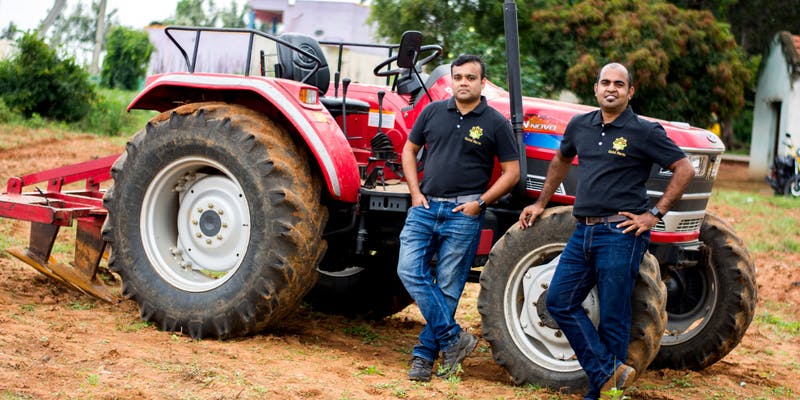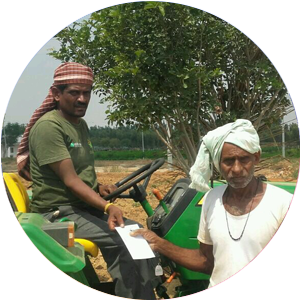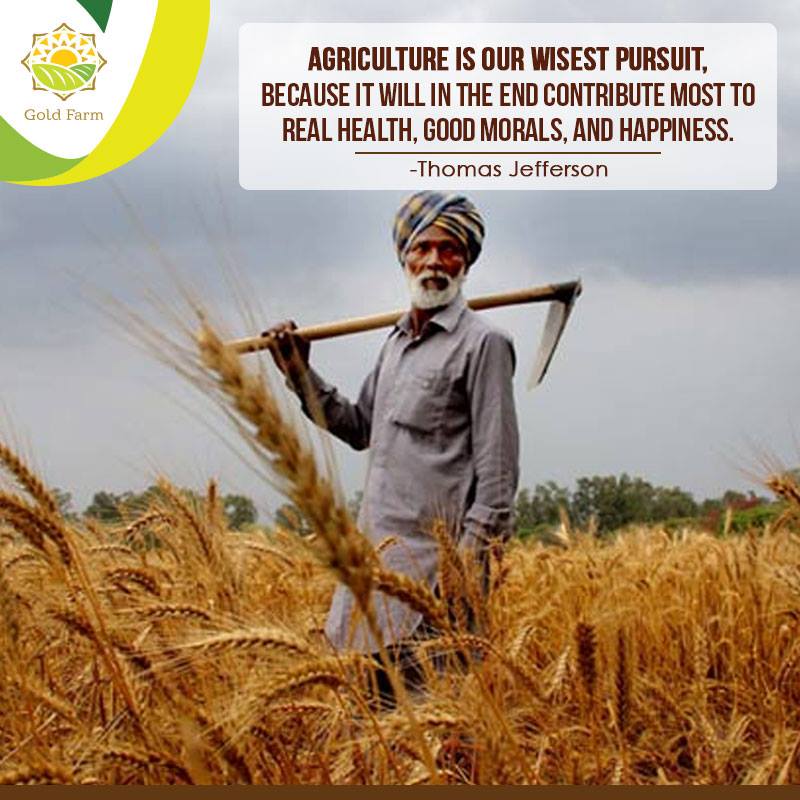Making an Impact: This ‘Gold’ Idea by 2 Friends Is Just What India’s Farmers Need
Agriculture in India is characterized by small landholdings and the presence of a large number of subsistence farmers.

Through our new series ‘Make an Impact’, we at the Better India aim to explore the multiple facets and nuances of the social impact sector from multiple perspectives – the entrepreneurs, investors and beneficiaries.
This week, we speak to ‘Gold Farm’, and how this company is helping revolutionize agriculture through the sharing economy.
Agriculture in India is characterized by small landholdings and the presence of a large number of subsistence farmers. Owning farm equipment is an expensive affair, and coupled with the size of the land-holding and harvest cycles – a highly inefficient use of capital. Gold Farm was born with the idea of using the sharing economy (the ‘Uber’,’Airbnb’ business model) to make it resource efficient for farmers to access farm equipment.
Brainchild of founders Abhilash Tirupathy and Karthic Ravindranath, Gold Farm was started in September 2015.

This is a mobile-based application that helps farmers get farming equipment on rental basis. The farmers, using the app, can identify available equipment in their area, make bookings, and make payments. The equipment owner is able to rent out his equipment and is able to monitor its utilization.
“I started this company with my partner, Karthic whom I have known for almost twenty-three years now. It perhaps helped to start something with a friend. For Karthic this is his third start-up and for me the second. So we both brought some amount of experience to the table,” he says. At a time when being an entrepreneur is more associated with the urban markets, they went against the grain to focus rural markets.
Having been raised in an agricultural family, Abhilash had an understanding of the challenges and opportunities in the sector.
“I have always wanted to work in the hinterland and the size of the opportunity seemed exciting to us. Having grown up in a family where everyone was connected to farming either directly or indirectly was also one of the reasons why I felt so driven about this concept.”
When asked about the capital they started with he says, “Like most start-ups we initially began with a very modest sum between the two of us. Our first round of raising capital happened from friends and family and that was followed by a couple of angel investors,” he says.
In 2017, Gold Farm raised $2 million (Rs 13 crore) in seed funding from farm equipment and automobile manufacturer Mahindra & Mahindra and early-stage venture catalyst Infuse Ventures.

Being an entrepreneur leads to constant learnings. As an MBA graduate from IIM Lucknow, Abhilash entered the market with certain ideas, however as he started working with his customer base some of those changed. He places a lot of importance on being able to take feedback from the markets, and being humble enough to acknowledge the realities, and nimble enough to change your approach.
Narrating one such instance he says, “A rather popular scheme practiced rather successfully in consumer return companies is called the ‘referral scheme’. With each reference that a customer makes, he gets something and the person who has been referred also gets something.”
“Somehow applying that scheme to the villagers backfired terribly. Here we were thinking it would work very well,” he says.

“From a farmer’s perspective very early on they understood that if they are referring someone and they are making money of it, then this particular service is more expensive. So it worked against us as the customers felt that it is an expensive service. It’s a very peculiar insight. We never expected that.”
The second point that Abhilash mentions is that the farmer community is terribly underserved thereby making it simpler to keep them happy. Unlike other markets that requires a lot of marketing and inducements to ‘sell’ the product, the farmers sign up once they understand the benefits commercially.
“I thought I knew the village and farming community, given that my relatives are farmers. But being with them is different from transacting with them.”

“So it’s a question of understanding those differences,” he says.
Since both the founders in Gold Farm were part of founding other start-ups before this, we asked them whether the challenges remain the same or change with each start-up.
“Challenges I feel are directly proportional to ambition. So therefore the challenges only grow since you are never satisfied with what you have achieved. You are constantly looking for something bigger, better, faster – so it’s a finishing line which keeps moving,” he says.
Speaking about the market and the various kinds of investors that exist, he says, “As a start-up we are not really in a position to pick an investor. One in probably 100 companies gets to pick the investor and even in those cases it is a Series B or C round. In the seed funding stage, there really isn’t much of an option or choice. You go with the people who are able to understand your vision.”
At what stage of launching a company does an entrepreneur decide to raise capital?
Abhilash says, “While there is no hard and fast rule about raising capital, a wrong strategic investment very early on in the business can kill the business.”
Strategic investors do not come in with just financial returns in mind. They want business returns – how strategic is this business to their business. So it is better to avoid getting in strategic investors before you have been able to establish the business to a certain level. It can impact other strategic investors to look at your business at a later day.
“It is important to let the promoters get the company to a level that they have in mind,” he says.
Speaking about the mistake that most first time entrepreneurs make, he says, “Mis-management of cash flow is something that happens a lot. It is essential to have a firm grip on that. Entrepreneurs must understand the difference between profits on the books, and real business cash flows.”
In the next part of this feature, we speak with Infuse Ventures, the fund which has invested in Gold Farm, to understand their perspectives on the opportunity and the business.
(Edited By Vinayak Hegde)
Like this story? Or have something to share?
Write to us: [email protected]
Connect with us on Facebook and Twitter.
NEW: Click here to get positive news on WhatsApp!
If you found our stories insightful, informative, or even just enjoyable, we invite you to consider making a voluntary payment to support the work we do at The Better India. Your contribution helps us continue producing quality content that educates, inspires, and drives positive change.
Choose one of the payment options below for your contribution-
By paying for the stories you value, you directly contribute to sustaining our efforts focused on making a difference in the world. Together, let’s ensure that impactful stories continue to be told and shared, enriching lives and communities alike.
Thank you for your support. Here are some frequently asked questions you might find helpful to know why you are contributing?


This story made me
-
97
-
121
-
89
-
167











